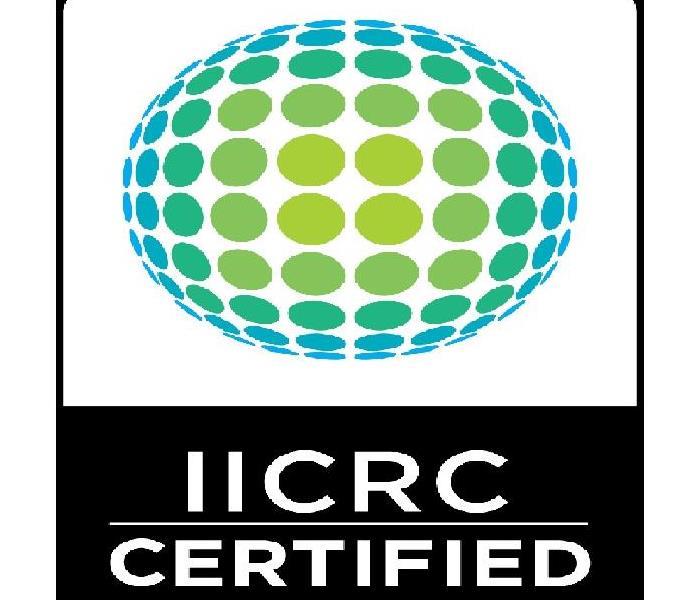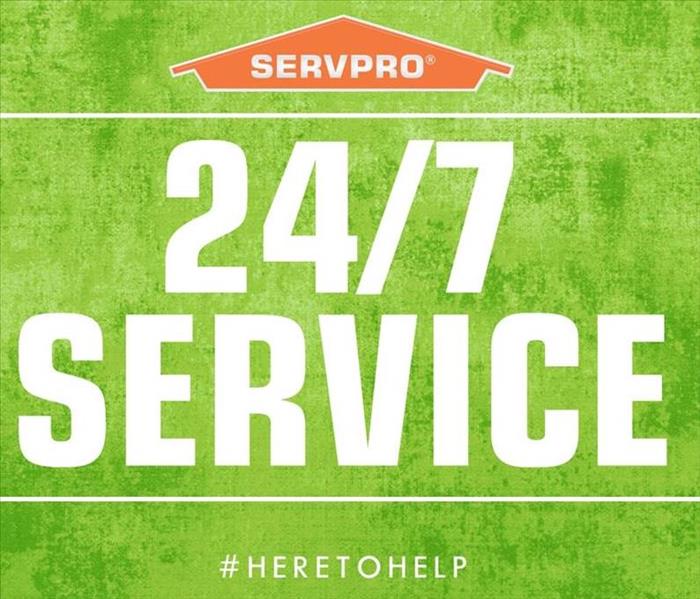Archived Water Damage Blog Posts
Take Steps to Prevent Plumbing Leaks
7/10/2023 (Permalink)
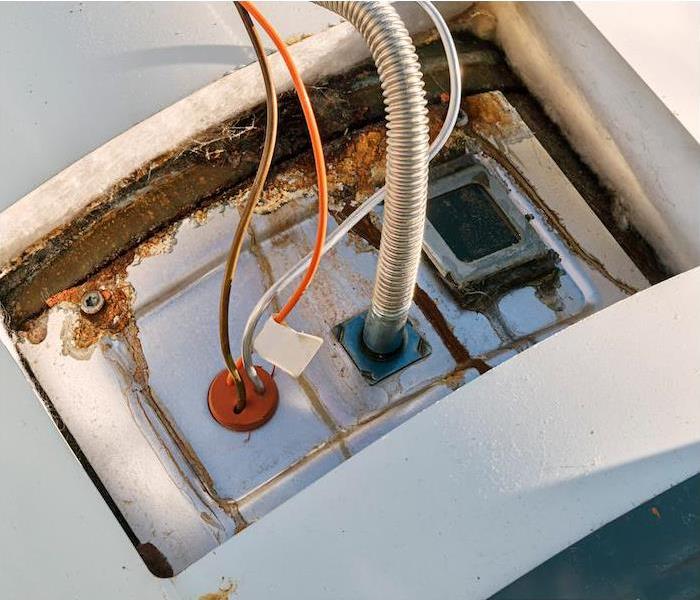 SERVPRO of Macon can help at the drop of a hat when you experience any water emergency.
SERVPRO of Macon can help at the drop of a hat when you experience any water emergency.
Plumbing leaks are no joke. They can spring up instantly and cause dramatic and costly damage before it can be brought under control.
In fact, the average household in the U.S. experiencing a leak loses 10,000 gallons of water per year—with over 1 trillion gallons nationwide combined yearly! While no one knows whether there is going to be an accident, there are still numerous methods to decrease the chance of a costly plumbing leak in the house.
By maintaining your plumbing, you can lower the risk of a plumbing leak and reduce the damage if one happens. Let’s consider what areas you can regularly inspect and maintain to prevent water damage in the home:
Appliance Water Supply Lines. Every appliance that uses water has water supply lines that are generally made up of plastic or metal tubing. As a result, it is critical to monitor these lines on a regular basis. Keep an eye out for corrosion, discoloration of the pipe itself and the flooring and walls around it, as well as calcium buildup in the supply line. One common modern preventive measure would be to consider upgrading to flexible stainless steel when replacing these lines.
Water Heater. Be sure to follow the maintenance instructions on your water heater carefully. A water heater can burst due to old age and devastatingly flood the room around it in minutes, potentially causing severe and costly damage to your home. A water heater should be inspected by a professional plumber every few years, and if it’s in a location where a leak would be truly devastating, consider installing a leak detector.
Drains. All sinks, disposals, showers, tubs and toilets should be consistently maintained and clean of debris. Make sure that you and other family members are aware of what should and should not be flushed or poured down the kitchen sink. Additionally, if you have a family member that is an over-consumer of toilet paper, consider installing a bidet to prevent build up in your pipes.
Finally, if a leak has sprung out of control, it’s important to know where the main water valve is and how to shut it off. It’s essential that everyone in the home is aware of how to shut the water main line off in the event of an emergency, considering you never know when the emergency can happen.
SERVPRO can help at the drop of a hat when you experience a water damage emergency. Call the experts at SERVPRO of Macon. We are available 24⁄7 to respond immediately and get the job done professionally.
Water Damage in Your Bathroom
6/23/2022 (Permalink)
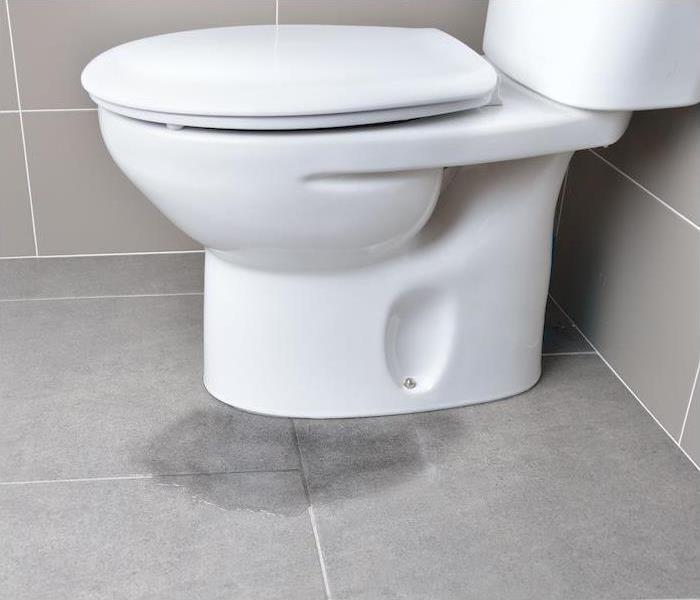 Should you experience any water damage, call SERVPRO of Macon, We are available 24/7.
Should you experience any water damage, call SERVPRO of Macon, We are available 24/7.
Because bathrooms use a lot of water, it’s likely that some of that water may seep into the walls and flooring, producing water damage. And if you’re not careful, you might wind up with damage that requires considerable and costly efforts to restore.
In fact, the average cost of bathroom water damage repairs is over $3,000 in the U.S.
While there is always a potential that water can cause damage in your bathroom, if you follow these easy steps, you can avoid costly water damage. Prevent water damage to your bathroom by following the advice below.
Check for Leaks. Check for symptoms of leaks on a regular basis, such as discoloration or soft spots on walls or floors as well as musty odors. Test the walls and floors by pressing in to them to see whether certain places are softer than others. Look for leaks under vanities and around the shower or tub and verify that there isn’t any leaking. If any of these issues occur, track out the source of the leak and get it repaired.
Ensure Proper Sealing. Properly sealing areas of your bathroom that could otherwise allow water to leak out into your walls and flooring can make all the difference when it comes to preventing damage to your bathroom. Prevent water from leaking behind walls and under floors by replacing broken, damaged or missing tiles in your shower, flooring and backsplash. In the same way, ensure your sealing is fresh and working properly. Replacing cracked or failing grout and caulking around sinks, tubs and showers with a silicone-based bathroom-grade caulk can make all the difference in water-proofing your bathroom.
Continually Inspect Your Bathroom. Maintain your leak-free bathroom by regularly checking the floor and walls for water after showering or bathing, drying or removing it immediately if there happens to be any. Additionally, don’t let any water stay standing in the shower or tubs by draining it completely. This helps to prevent the harm that standing water might cause.
SERVPRO has the expertise to assist you with all forms of recovery from water damage. When you discover water damage in your bathroom, call the experts at SERVPRO of Macon. We are available 24⁄7 and seven days a week, including all holidays because disasters don’t wait—and neither do we.
Do you need a sump pump?
6/8/2022 (Permalink)
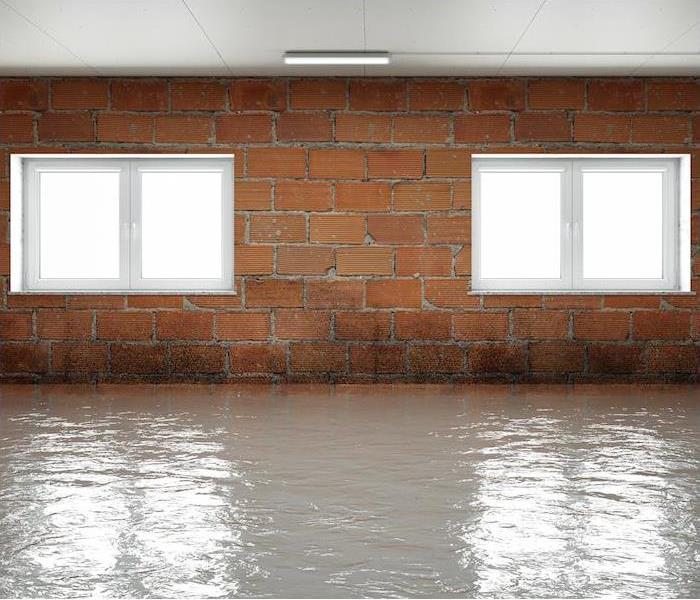 Call the experts at SERVPRO of Macon to get you back to dry. We are on call 24/7 to take care of any immediate need.
Call the experts at SERVPRO of Macon to get you back to dry. We are on call 24/7 to take care of any immediate need.
You may have heard of someone talking about their sump pump after heavy rain. Perhaps they were talking about how if it weren’t for their sump pump, their basement would have flooded, costing them big-time in damages.
Let’s take a look and see if a sump pump is right for you and your property.
WHAT IS A SUMP PUMP?
A sump pump is a device that can be installed beneath your home’s lowest point, such as the basement or crawl space. This little but extremely useful tool can help prevent flooding.
The pump is always on standby, waiting to be activated. When the soil surrounding your home gets oversaturated after a heavy rain, excess water flows toward the sump pit, which fills up with water.
The sump pump is activated, and the pump is turned on, removing water from the pit and draining it away. A sump pump prevents the groundwater from rising above the level in which it is installed, preventing flooding. In many ways, sump pumps are essentially immediate flood insurance.
SHOULD YOU INSTALL A SUMP PUMP?
There are many advantages to installing sump pumps if your property needs one. Let’s take a look at the following and determine if you should install a sump pump at your property:
- If you live in a region where there is significant rain and/or snow. Here in Georgia, flooding from storms of different kinds are very common, especially throughout the spring and summer seasons. It’s very common to see basements in this area flood after these storms.
- If your house is in a floodplain, you will want to consider a sump pump. Groundwater levels are more likely to rise after heavy rains, snowstorms and spring runoff in areas with poor drainage and lower elevation properties in valleys surrounded by higher elevation hills.
- If your basement has previously flooded, it is a good idea to install a sump pump, as it’s likely it won’t be the last time.
- If you’ve finished your basement, consider installing a sump pump to safeguard your living space and protect carpeting, furniture and other items in your underground living space from flood damage.
If your basement floods, call the experts at SERVPRO of Macon to get you back to dry quickly and professionally. We are on call 24⁄7 to take care of your emergency immediately.
The 411 on Commercial Water Damage Prevention
4/19/2022 (Permalink)
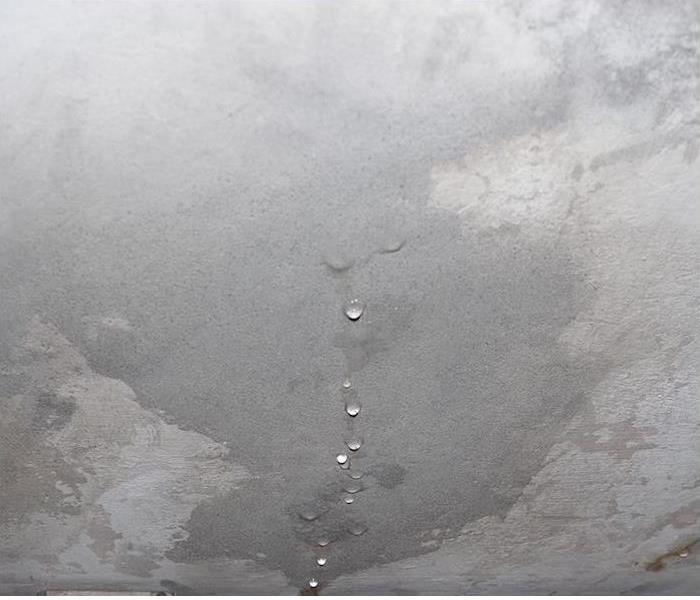 If your business is affected by water damage, reach out to your local restoration expert SERVPRO of Macon.
If your business is affected by water damage, reach out to your local restoration expert SERVPRO of Macon.
Water damage is often unanticipated and comes in all shapes and sizes, whether it is caused by a flash flood, a burst pipe or a leaky roof. No matter if it is pooling water in your ceiling that can go unnoticed or you’re standing in water up to your knees, water damage can cause significant untimely and costly interruptions to your operations.
In many circumstances, however, preventive measures can be taken to avert severe delays or property damage. The following are a few recommendations to inspect and prepare you in protecting your facility from water damage:
Check for plumbing issues. One indicator of plumping issues could be if you’ve observed a substantial increase in your water bill, a pipe or plumbing equipment is almost certainly to fault. You can check your walls, floors and ceilings for indications of leaks. Discoloration or mildew development is also a reliable indicator that a pipe is damaged or leaking. Whatever you discover, be certain to get it repaired as quickly as possible.
Install a water-sensing device. You can find water sensors available at practically any home improvement store. The devices provide alerts or alarms in the case of a water leak, allowing you to contain the damage and respond quickly. The majority of sensors may be connected to your smartphone or integrated with your facility’s security system, enabling you to get alerts even while you’re not on-site.
Look at the windows and doors. Water making its way indoors from outside during storms or rain is another frequent cause of water damage. Examine the area surrounding your windows, doors and any other exposed locations. Be sure to reseal any gaps or cracks using caulking that is waterproof. Additionally, refinish window or door trim to provide additional protection against decaying seals and trimming.
Regularly inspect the roof. Have an expert inspect your roof to discover places that might leak. Different types of roofing may need different treatments such as sealing on a regular basis to provide an additional layer of protection. Additionally, remember to clean the gutters to ensure that rainfall flows easily away from the roof. Take note of locations that are prone to drainage problems. Along the outside your building, be sure to look for spots that may be prone to water accumulation if the ground gets too wet. Consider getting the help of a landscaper or drainage specialist to do an inspection of the area and provide proper draining.
If your business is affected by water damage, enlist the help your local experts at SERVPRO of Macon. We are here to help 24⁄7 whenever disaster might strike.
How Does Water Damage Lead to Mold?
3/14/2022 (Permalink)
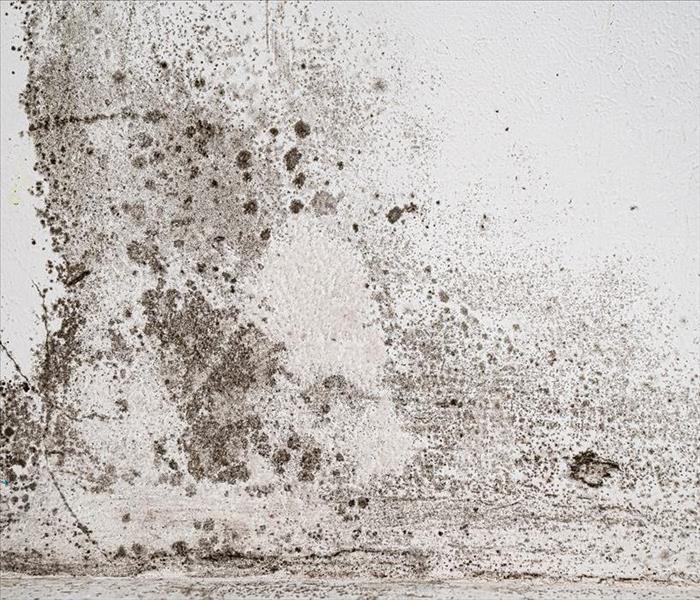 If mold invades your home, call SERVPRO of Macon today!
If mold invades your home, call SERVPRO of Macon today!
Water damage is something that no homeowner ever wants to experience, but unfortunately, it is a rather common occurrence. Between hidden leaks that can pop up in your plumbing system, water seepage in crawl spaces or surprise roofing issues, there are lots of ways that water damage can pop up in a home.
While water damage is an inconvenience, it can lead to an even more pressing concern: mold growth. Mold growth thrives in damp places, so any time water works its way into an area it should not be in, there is a high chance that mold will find its way there as well. Below, we will look at why mold and water damage are so closely related so you can be on the lookout for any signs of growth.
Why Water Damage Often Leads to Mold
**Mold loves humidity.** The nature of water damage can vary, but in incidents where there is flooding or general dampness in an affected area, the humidity levels can get rather high. Basements, laundry rooms and bathrooms can all turn into very humid areas, which can create the ideal environment for mold to take hold. Ideally, the humidity in an area should stay below
50% at all times in order to discourage mold growth.
**Mold spores need moisture to grow.** Many people are surprised to learn that mold spores are everywhere—in nature, mold aids with the decomposition of organic material, and its spores spread via the air. Therefore, mold spores are always floating around looking for an ideal place to land, which is how they wind up in homes (often after hitching a ride on clothes, shoes or pets). However, mold spores require moisture to grow, so while they may work their way into homes, if they cannot find an area with moisture that they can grow, they will not be able to
reproduce.
**Mold grows well in contaminated waters.** Oftentimes, water damage is caused by water that is not necessarily clean, such as rainwater or floodwater. Mold can grow especially well in these types of waters because of all the bacteria that is already present, making water damage of this type especially susceptible to mold growth.
*If you are curious about how mold remediation works, we are here to help. Contact us today to learn more about our remediation services or to report mold damages.*
What Conditions Are Right for Mold to Grow?
3/8/2022 (Permalink)
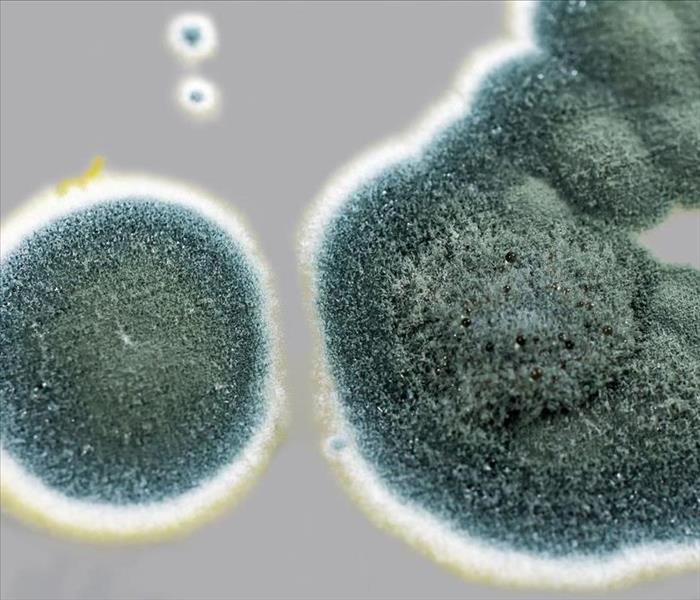 Mold can cause health effects. Call SERVPRO of Macon if you have mold in your home.
Mold can cause health effects. Call SERVPRO of Macon if you have mold in your home.
Mold growth is a complicated issue for homeowners to have to face. While mold can only grow if the conditions are right, there are many instances where this is the case—and once mold establishes itself, it is extremely difficult to fully get rid of it without professional help with the remediation process.
Fortunately, the conditions where mold is likely to grow can be abated in most instances. Because prevention is so important when it comes to mold management, today we will be looking at the conditions that are ideal for mold to grow and how they can be prevented.
The Conditions That Mold is Likely to Grow In
**Warm, humid conditions.** Mold requires moisture to grow, but it does not always have to be standing moisture that allows it to start its process. Humid areas, such as bathrooms, basements and laundry rooms, are prime candidates for mold growth in the home. When the air in an area becomes saturated with humidity, it can lead to high moisture throughout the room which can allow mold to become established.
**Poorly ventilated areas.** Mold spores are spread via the air, so when areas are poorly ventilated, it is much easier for mold to settle in one spot and begin to reproduce. This is doubly concerning as areas with poor air circulation are also typically areas with high humidity, which can create an even more ideal environment for mold spores to land in. Installing fans or other types of air flow system in areas without much ventilation is a great way to prevent mold.
**Any area with untreated moisture damage.** Mold will often establish itself around water damage, as it thrives on moisture. Any area that has a buildup of moisture is ripe for mold growth, which means hidden leaks are often first identified by the signs of mold around the area. This is why it is so important to have water damage abated quickly and professionally when it occurs, because the longer it is left untreated (or if it is untreated properly), the worse a mold problem is able to become.
*If you are in need of mold remediation or would like to learn more, we would love to help. Contact us today to learn more about our mold remediation services!*
What Types of Places Are Likely to Attract Mold Growth?
3/3/2022 (Permalink)
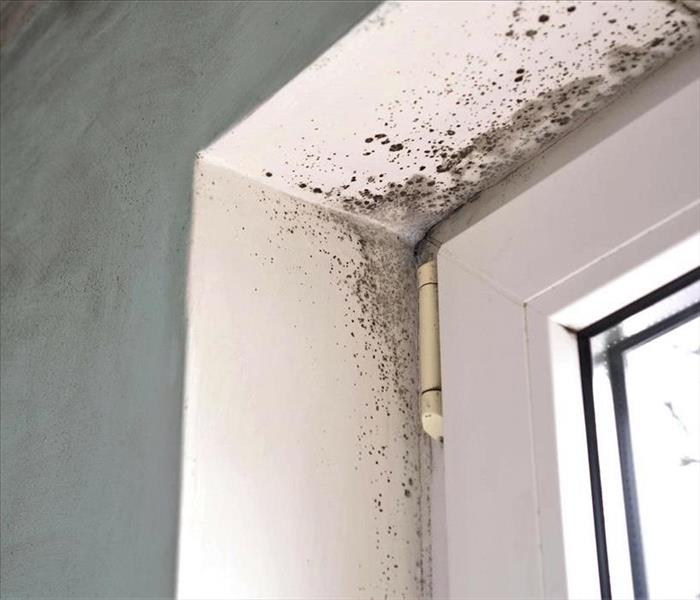 If mold invades your home, call SERVPRO of Macon to evict it!
If mold invades your home, call SERVPRO of Macon to evict it!
Mold growth can be a frightening thing for homeowners to deal with. It is an insidious and stubborn problem that can cause significant damages if not treated quickly and professionally by mold remediation experts—but how do you know if you are at risk of experiencing mold growth?
One of the only positives about mold is the extremely specific conditions that it needs to grow. Mold is only likely to be found in a few places where the environment is right for it to be able to take hold.
Below, we will be taking a look at what these places are so homeowners know exactly where to keep their eye out for these harmful spores. Preventing mold and treating it quickly when it does arise is the best way to stop the issue from getting out of hand.
The Places Where Mold Is Likely to Grow
**In bathrooms and laundry rooms.** Mold thrives in areas with high moisture content, so anywhere that experiences regular and high humidity—such as bathrooms and laundry rooms—is likely to be a haven for mold. Establishing consistent airflow and mitigating the humidity in these areas can go a long way in preventing mold from ever growing in these places.
**In basements and crawl spaces.** Basements and crawl spaces are often popular spots for mold to be discovered because of how ideal their conditions are. Not only is humidity typically high in these areas, but they are also often dark and may even experience water damage from ground seepage if they are not properly weatherproofed. Dank odors and condensation in these areas are often a sure sign that mold is likely to take hold.
**In areas that have experienced water damage.** Water damage is a serious issue for several reasons, including the fact that it is likely to give rise to mold growth if it is not treated properly. Whether the water damage is from a hidden leak in the plumbing system or a flooding issue, it is important that it be addressed quickly by water restoration professionals to completely remove the moisture and ensure that mold is not likely to become a lurking threat.
*If you are in need of mold remediation, water damage restoration or would simply like to learn more, we are here 24/7 to help. Contact us today to learn more about our services.*
So You’ve Got a Sewage Backup
2/2/2022 (Permalink)
 Sewage backup can be a serious problem, reach out SERVPRO of Macon to learn more.
Sewage backup can be a serious problem, reach out SERVPRO of Macon to learn more.
Water damage can be rough stuff in any form. Burst pipes, flooding and appliance issues all create difficult situations in their own right. But a sewage backup can be an entirely other level of both nastiness and danger.
Sewer problems can be the result of civil sewer systems that have aged past their primes, tree roots growing into sewer lines or blockages of a sanitary sewer main. Regardless of the cause, however, one thing is clear (or literally probably not clear at all)—sewer backups introduce toxins into your home, and they leave a difficult cleanup job in their wake.
When you find yourself faced with sewer damage, here are some things you should do immediately upon discovering the damage to ensure your safety and get things under control until your local SERVPRO team arrives.
Evacuate anyone vulnerable from the area. This includes seniors, children, even pets—anyone who may suffer more readily from the toxins sewage can introduce into your home’s atmosphere. Keep them safely away from the backup area until restoration is complete.
Shut off your main water supply and electricity if it’s safe to do so. If you can get to your power panel and water main safely, use them to stop the flow of water and decrease the odds of your water backup causing an electrical fire. Don’t do this if your electrical panel is under water, or if you would have to stand in water to turn it off. If you can’t safely shut off your own power and water, call your utility companies and have them do it.
Open windows in the affected area to encourage ventilation and get some fresh air flowing in.
Document your situation and take lots of photos for your insurance company. Be sure to include any items that have sustained damage, as these will be important for your insurance claim process.
Add a little bleach to standing water, if you can do so safely, so that the chlorine in it can do some disinfecting work and prevent the spread of bacteria. Don’t touch stained or affected areas, and don’t come in contact with what could be very dangerous water.
Don’t forget to call SERVPRO. We’ll be there quickly, get things cleaned and managed thoroughly, and we can work with your insurance company on your behalf.
Regardless of the cause of your sewage problem, SERVPRO has the tools and techniques to make it “Like it never even happened.”
Sewage backup is a serious problem, but we can take care of it and restore your home after the damage. Contact SERVPRO anytime to get the pros on your side.
The So-Called 100-Year Flood
2/2/2022 (Permalink)
 If flooding or other water damage cause trouble for your home or business, contact SERVPRO of Macon.
If flooding or other water damage cause trouble for your home or business, contact SERVPRO of Macon.
Flood probability is based on a number of factors, and scientists and engineers use a specific set of criteria to determine the likelihood that rivers may flood in heavy storms. Flooding can happen wherever it rains, and it can cause troubles like 2019’s sudden troubles in Conyers; but there’s a certain term on which much of our flood conversation hinges: the “100-year flood.”
It’s a rather foreboding term, one that definitely makes the listener aware that it’s something to be concerned about. But what exactly is it? Is it a general term, or are there actually 100-year floods we can measure and predict?
First, a 100-year flood is a very real, scientific measurement, as opposed to a general declaration like, say, a gullywasher or deluge. Without getting overly technical, a 100-year flood is, in theory anyway, a flood that statistically should only occur about once every 100 years.
In other words, based on data from nearby rivers, bodies of water, elevation levels and other factors, a 100-year flood is a flood that has a 1% chance of occurring in any given year.
This kind of flood is also known as a 1% Annual Exceedance Probability (AEP) flood.
So, does a 100-year flood only occur every hundred years? Well, yes and no. While the average space between them typically does meet that criteria, that doesn’t preclude the possibility of two 1% floods happening in back-to-back decades, years, or even months.
Flooding is unpredictable, but statistically speaking, the 100-year or 1% designation gives us a baseline for estimating the frequency and severity of a certain kind of flood.
Why does all this matter? Well, for one thing, aside from giving us a sense of how bad a flood was or could be, and how likely it may be to occur again, the 1% AEP flood is the basis for the National Flood Insurance Program, which, among other things, requires homeowners within high-risk flood zones to carry flood insurance.
So you can see why it’s important that we have both accurate flooding data and analysis as well as risk prediction. The accuracy of the portrait and prediction of 100-year floods could impact whether your home sits in a high-risk zone or not.
The 1% analysis also helps us plan things like infrastructure, drainage and building needs for flood plain areas.
The last 100-year flooding in our area came in the form of massive floods in September 2009, which resulted in half a billion dollars in damages, and actually reached the 500-year flood designation in some areas, meaning there was only a 0.2% chance of that flood occurring that year in this area.
Flooding isn’t inevitable, but it’s always a possibility when heavy storms overwhelm bodies of water or drainage systems. If flooding or other water damage cause trouble for your home or business, contact SERVPRO for fast, complete cleanup and recovery.
5 Places to Check After a Hard Rain
2/2/2022 (Permalink)
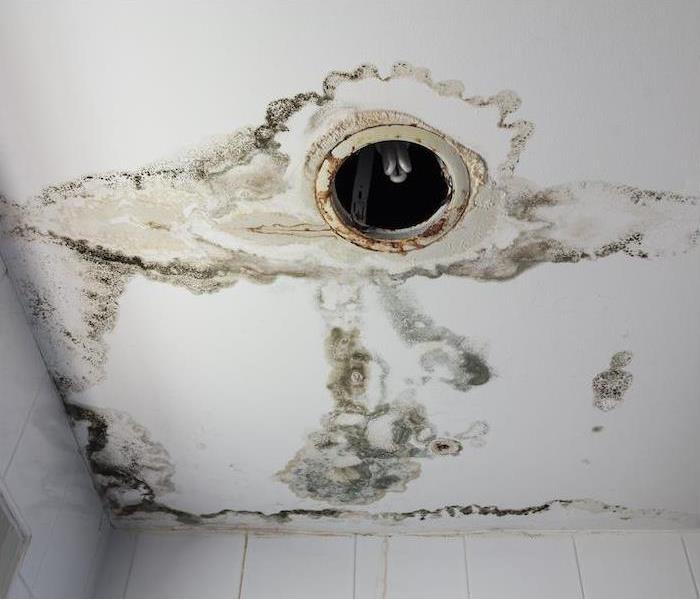 Water damage can come from a number of places. If you find any signs of damage to your property, call SERVPRO of Macon.
Water damage can come from a number of places. If you find any signs of damage to your property, call SERVPRO of Macon.
We get plenty of rain in the Fayetteville area. The national average for a given city is 38 inches of rain per year, and we beat that average that by more than 10 inches.
Now some of that rain courtesy of your standard, near-daily summer shower. But some of it, as you well know, comes from storms that pack quite a bit more punch.
As a homeowner, it’s incumbent upon you to protect your home as much from water damage as much as possible, or at least to stop it once it’s discovered. So after a heavy rain, here are the places you should check to make sure all is well.
Check your basement. If there’s one solitary place you can anticipate water damage at home, it’s the basement. Homes with basement have a 98% chance of experiencing excess moisture or flooding at some point, so check here first. If you see water pooling, paint bubbling or you smell a damp odor, you may have an issue.
Crawlspaces and attics. Much like the basement, these areas can become inundated with moisture. If you have a crawlspace instead of a basement, it’s subject to the same kind of moisture issues, and attic moisture can reveal to you that there’s a leak somewhere in the roof.
Check on your sump pump. Your sump pump works hard to move water away from your house during a big storm. You should test your pump quarterly, or after any major rainfall.
Examine your gutters. Your gutters catch more than rain, and there are plenty of ways for them to get clogged or even damaged. In particularly heavy rains, gutters can be overwhelmed by water flow, and that becomes even more likely if they are obstructed due to built-up dirt, granules from roof shingles, twigs and leaves.
Inspect your roof. You don’t have to get up on a ladder every time it rains, but after a heavy storm, particularly if you have overhanging tree branches, take a good look at your roof from the ground. If you notice anything that looks off—broken or warped shingles, unfastened flashing or gutters that seem out of place—call a professional to conduct a full examination.
Water damage can come from a number of places at home. If you find a source of water leakage has done harm to your property, call your local SERVPRO for fast, expert help.
The 3 Toxicity Levels of Water Damage
1/31/2022 (Permalink)
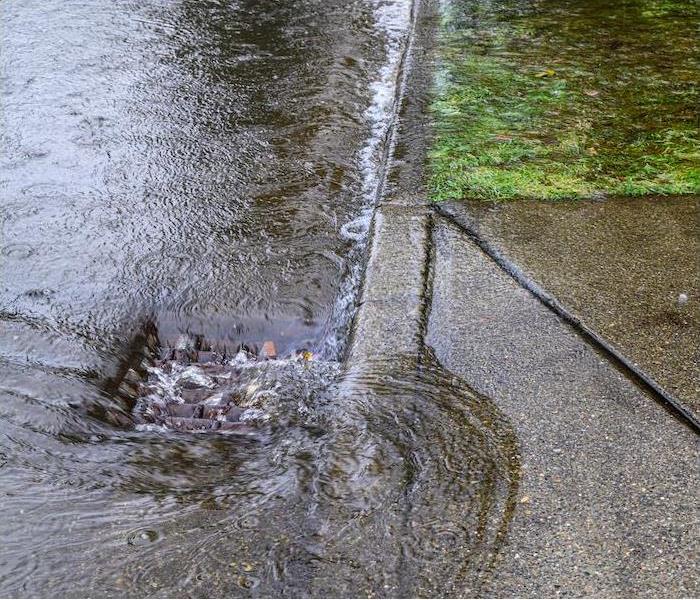 No matter the water damage, we can quickly set things right. Contact the SERVPRO of Macon team to learn more.
No matter the water damage, we can quickly set things right. Contact the SERVPRO of Macon team to learn more.
Water damage can happen all sorts of ways, and it can certain cause myriad problems, not the least of which is its potential for toxicity. But how do we determine which water sources are toxic and which aren’t? Why isn’t it safe to touch or swim in floodwater, but rain is fine—aren’t they the same?
These distinctions are very important, and there’s a governing body called the Institute of Inspection, Cleaning and Restoration Certification that helps us understand them.
Category 1: Clean Water Damage
Damage from so-called “clean” water is the least worrisome kind of damage, and assumes a certain level of cleanliness from its sources—typically things like refrigerators, water supply lines for appliances or even showers.
The nature of this type of damage means most of the damage mitigation involves simple drying, extracting and dehumidifying, and most instances of clean water damage don’t create health worries.
Category 2: Grey Water Damage
The next category is referred to as “grey” water. The sources of grey water include sources that aren’t inherently or necessarily toxic, but that could or may be—overflow from toilets, backups from an unfiltered sump pump, or even leaks from a washing machine which could have been holding toxic materials during the wash cycle.
Touching water from these sources may not cause immediate harm, but grey water is still to be avoided as it could cause potential danger all the same.
Category 3: Black Water Damage
“Black” water is the nasty stuff. It carries an immediate, inherent risk of toxicity, sickness or bodily harm, and it requires immediate action for removal to get these risks mitigated. Sewer backflows, broken toilet bowls containing fecal matter and other septic water fall into this category.
It may surprise you, but overflowing ground and river water fall into this category, as does flood water, because they may contain everything from waste to lawn-care chemicals and parasitic organisms. Black water can cause disease and immediate harm, and affected surfaces like carpet or sheetrock must be removed. This water is also the most difficult to deal with in the aftermath, because it requires such care in cleanup.
No matter the water damage or the level of toxicity or danger to your home or family, we can quickly set things right. Contact your local SERVPRO team today to find out how we can tackle water problems of any size or nature.
Common Sources of Water Damage in the Home | SERVPRO® of Macon
9/8/2021 (Permalink)
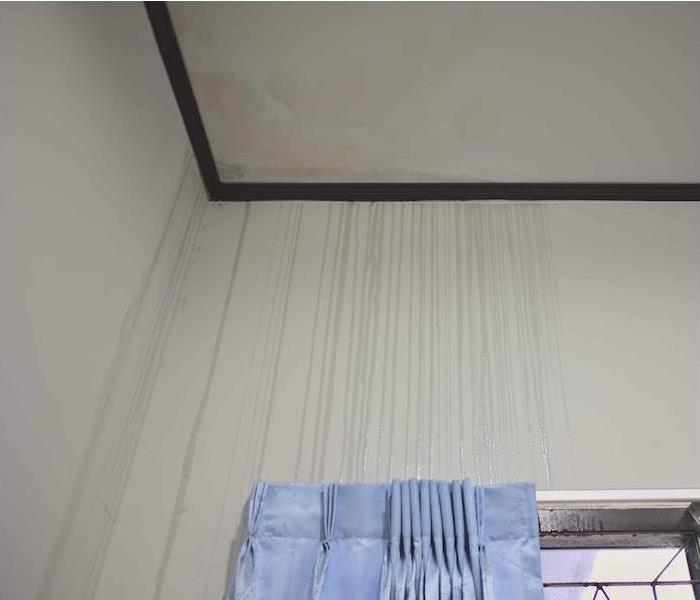 A water leak can turn into a big problem. Contact the SERVPRO of Macon team if you are dealing with any water damage.
A water leak can turn into a big problem. Contact the SERVPRO of Macon team if you are dealing with any water damage.
Water disasters are nothing that a homeowner looks forward to. Nobody wakes up and thinks, “Boy, I sure hope I get to deal with water damage today.” But water is always looking for a place to go, and any crack or crevice will do.
Educating yourself about the different places water can intrude into your home is smart! Let’s look at a few of the most common sources of home water damage:
Toilets. Toilet flappers can be leak-prone. The flapper is used every time the toilet is flushed. Many times, an audible sound of water running can be heard if the flapper is leaking.
Dishwasher supply line. Dishwasher have a supply line, tub and a drain system. All of these systems have the capability to leak. However, supply line leaks are particularly destructive because the water is under pressure. The supply line must be securely connected to the dishwasher and should be made of stainless steel.
Clogged gutters and ineffective slope. The water that falls on your roof drains into the gutter system. Debris-free and properly working gutters can carry the water into the downspouts and away from the home. Downspouts should be at least 24 inches away from your home, and the soil should be sloped away from your foundation. The final grade of a house should be sloped at least 1⁄2 inch per foot for 10 feet away from the house.
Separating shingles. Shingles can separate for any number of reasons. Storms, falling debris from trees, age and improper installation are a few. Shingles (and the roof in general) should be inspected quarterly and after a major storm.
Old clay piping. Clay piping has gone through some technological upgrades. However, many homes built before the 1980s may have clay piping that drains the household wastewater to the septic system or sewer. Clay pipes turn brittle with age and can fail. They are also susceptible to root intrusion.
Clogged disposal. Grease should be allowed to solidify and then tossed into the garbage. Grease down the drain is a recipe for a plumbing disaster and can be expensive to remedy. Degreasing a sewer line is best left to a professional.
It’s important to regularly inspect the systems that move water into—and out of—your home. Catching a problem before it turns into a disaster can save you time, money and stress.
If a water leak erupts into a big problem at home, you’ve got the best team in the business on your side. Contact SERVPRO today so we can get started.
SERVPRO of Macon is an emergency service company. We're available 24/7!
Preventing Basement Water Damage by Knowing the Signs | SERVPRO® of Macon
5/24/2021 (Permalink)
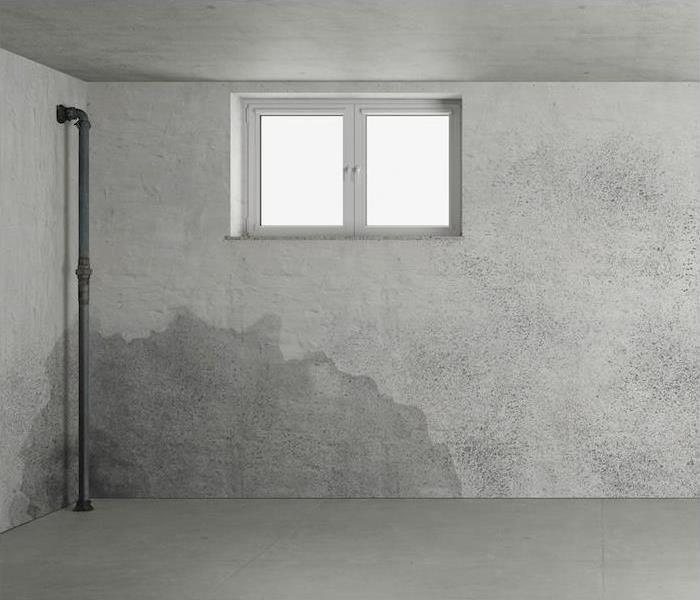 SERVPRO of Macon is a full restoration company. Our team of experts are on call and ready to help you determine best course of action.
SERVPRO of Macon is a full restoration company. Our team of experts are on call and ready to help you determine best course of action.
If you have a home with a basement or are considering buying one, you are likely quite familiar with just how beneficial they can be. Unfinished basements are fantastic storage areas and provide shelter from threats of severe weather, and if you are able to finish your basement, it adds quite a bit of living space onto the home.
While there are many beneficial elements to having a basement, it is important that homeowners are aware of their potential drawbacks, too. Water damage often has its way of working into basements and causing issues, and if left untreated, these can become serious problems.
Fortunately, by knowing the sign of basement water damage, homeowners can tackle the problem quickly and mitigate any issues that may arise.
What to Watch for in Your Basement That May Indicate Water Damage
Unpleasant, musky odors. The water that leaks into a basement is often clean water, but that does not mean that musky odors can’t still develop. Water leads to mold and mildew growth, and as the water evaporates and leaves the bacteria behind, a musty odor can develop. Oftentimes, this odor is the very first thing that homeowners notice when they have water damage on their hands.
Flaking paint on masonry or walls. We frequently see well-intentioned homeowners paint cinderblock walls or flooring in their basement as a tactic to prevent water damage, but unfortunately, this just serves to mask the issue temporarily. If there is an underlying issue causing water to seep in, paint will only temporarily provide a buffer. Eventually, it can begin to peel, crack and bubble due to the water damage working its way in underneath.
Foundational cracks. As a house shifts and settles over time, it is normal for some hairline cracks to develop throughout the basement. These cracks are tiny and of no concern, usually. However, if there are cracks running along the ceiling, the walls or the floor that are larger than a hairline, that may be an indicator that a serious water damage issue is lurking under the surface.
If you notice any of these signs in your basement, let us take a look. Our expert water restoration technicians can help you determine what is causing these issues and how to treat it properly. Contact us today to learn more.
How a Small Leak Can Become a Big Problem
4/9/2021 (Permalink)
Putting on “band aids” to temporarily fix a leaking pipe under the bathroom sink or a towel under the refrigerator because the seal is bad will lead to a bigger problem in the long-run. Overtime that small leak can lead into one issue to another- like Mold or structural damage. Being proactive and regular checking, these potential threats could save you money or even an insurance claim!
Standing water and moisture will create an environment for bacteria and even mold growth. In some cases, it may appear on the outside the area is dry but underneath could be a perfect spot for mold or bacteria to grow. The experts at SERVPRO of Macon uses specialized equipment to determine what porous materials may need to be removed or repaired. The level of restoration will depend on the category of water that occurred when the damage happened.
Steps from Beginning to End
- Inspection and Assess the affected area(s)
- Extract the Water and Mitigate to prevent further damage
- Drying and Dehumidifying
- Cleaning & Sanitizing
- Complete Restoration-Restore your home and begin repairs if needed
Call SERVPRO of Macon
All of our IICRC Technicians are certified and will follow the industry standards to ensure your home is clean, dry and safe! Water damages happen every day and can happen at any time. SERVPRO of Macon is an emergency service that’s available 24-hours, 7 days a week including holidays. Contact us anytime at 478-474-6700.
SERVPRO of Macon offers Sewage Clean-up
4/9/2021 (Permalink)
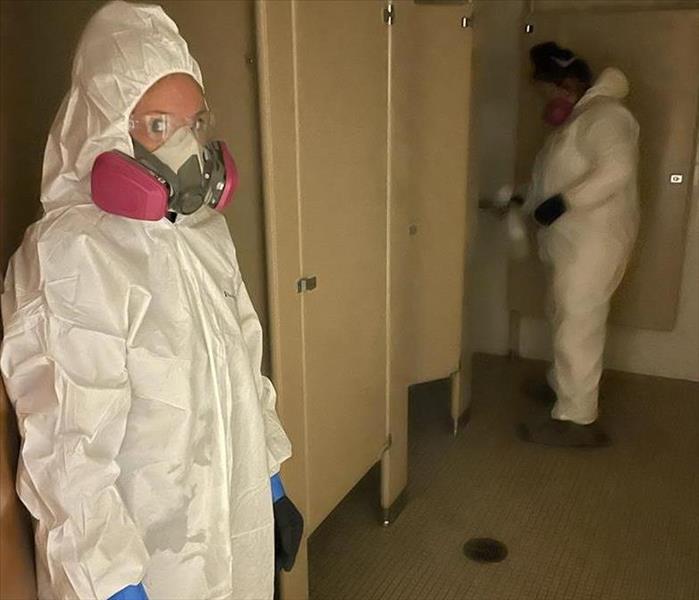 Pictured are two of our technicians cleaning, sanitizing & deodorizing after a backed up commode at a local business.
Pictured are two of our technicians cleaning, sanitizing & deodorizing after a backed up commode at a local business.
Have you ever been sitting in your home or business and hear gurgling noises coming from a different part of the house? Or walked into the employee restroom and smell, see and hear sewage backing up into the commodes? More than likely a sewer line has backed up into your home or business. Backed up sewer lines can leave your home or business with several inches of bacteria. Not to mention, it can be EXTREMLY DANGEROUS to you, your family members and/or employees.
Common Sewage Issues
- Sewage line backup
- Overflowed commode or sink
- Leaking appliances
- Tree roots
- Grease
Who do I call?
Contact your local plumber to get to the root of the problem. Once that has been fixed-
You call SERVPRO of Macon right away! With over 40 years of experience, IICRC trained technicians and the latest equipment, we can get your property back “Like it never even happened.” Depending on the severity of the damage, sewage can destroy flooring, walls, furniture, clothing and priced possessions. Sewage carries all sorts of bacteria, diseases and toxins that can be very harmful. But don’t worry, we will take care of getting your home or business free, dry, clean and safe for your return.
SERVPRO of Macon is locally owned and operated and have been in the Macon and middle Georgia area for 40 years. We will arrive in full PPE (Personal Protective Equipment) and move swiftly to remove all the contaminates safely and effectively, sanitize and deodorize the affected areas and restore your property.
Contact us day or night at 478-474-6700!
SERVPRO of Macon's 1st Virtual CE Class
4/9/2021 (Permalink)
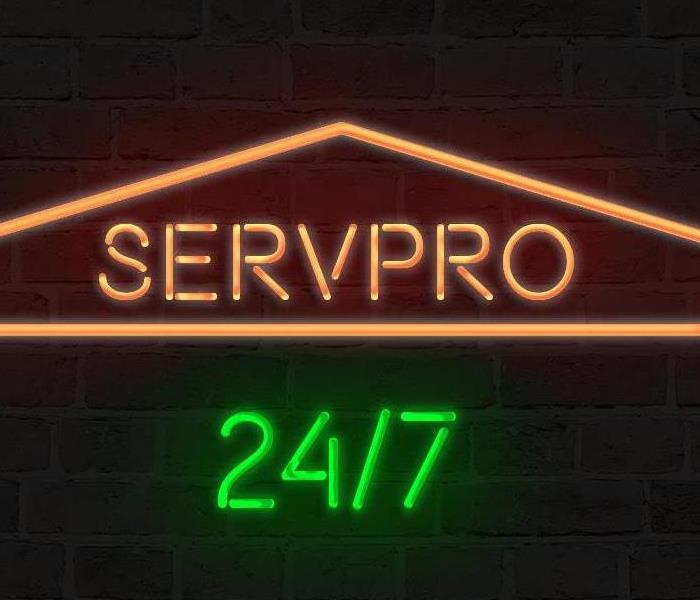 For any questions about the CE Class call us at 478-474-6700 or email afloyd@SERVPROofmacon.com
For any questions about the CE Class call us at 478-474-6700 or email afloyd@SERVPROofmacon.com
SERVPRO of Macon will be having our 1st Virtual Continuing Education class on April 22, 2021!
“Water Damage/ Restorative Drying for Water Damage”
Attendees will receive (2) insurance credit hours
Location: Virtual Classroom with Secure Password
Date: April 22, 2021
Time: 9:00 AM – 11:00 AM
Registration Time/Roll Call: 8:51am- 8:59am
Location: Virtual
Course #59575
*Please note, 100% attendance with photo ID is required to receive CE credit. Virtual classroom will open 1-hour prior to check photographic ID and confirm license number. * *You must have a camera and audio connection
The 2-hour Water Damage / Restorative Drying for Water Damage CE Course is scheduled to start at 9:00 am, and the secure password to access our virtual classroom.
Please note that even though the class is being held in a “virtual classroom,” specific state guidelines must still be met in order for you receive Continuing Education credit. On the day of the class we will need to confirm your identity, collect your Insurance License # / National Producer Number (NPN), and document your “time in” and “time out” of the classroom. This REQUIRES that you have a Zoom account and are using a device that has a camera and a microphone.
In order to do this securely, we will be opening our virtual classroom at 8:00 am, which is one hour before the class is scheduled to start. When you log-in, you will be placed in the virtual lobby, which will allow us to bring you, and the other attendees, into the classroom individually so that we can securely view and document this required information.
Should you have any questions, please reach out to me at 478-474-6700 or afloyd@SERVPROofmacon.com.
We look forward to seeing you in our class on April 22, 2021.
Have a Water Damage Emergency?
4/6/2021 (Permalink)
After the snow smelts, the sunshine is bright, the flowers are blooming and the birds are singing their glorious songs- it’s break time! Maybe take a day trip to a local beach or maybe a weekend get-a-way to enjoy the nice spring-like weather. As you’re walking up to your home you notice some moisture on the front windows. You silently panic and ask yourself, “Did I turn off the air conditioner”? Then the unthinkable is revealed. The air conditioner that’s installed in the attic has apparently stopped working! Maybe the pan overflowed or clogged drain lines? The ceiling appears to be wet and cracked. The temperature in the house is 85 degrees!
Call SERVPRO of Macon at 478-474-6700
You never know when things like this will happen. No matter what may have caused your water damage, you need immediate attention to begin the water removal process and structural drying to get your home back “Like it never even happened”. We have the equipment, the man-power and the time to assess the damage, mitigate and restore your home.
SERVPRO of Macon is a 24/7 emergency service for water damage. You can expect an immediate response day or night! We operate under the 1-4-8 rule for service response services. SERVPRO of Macon will help provide guidance and assistance to ensure the best decisions are made.
- ONE – Within one hour from the first notice of your loss, a SERVPRO Franchise Professional will contact you to arrange for service.
- FOUR – Within four hours of loss notification, a SERVPRO Franchise Professional will be on-site to start mitigation services.
- EIGHT – Within eight business hours of on-site arrival, a verbal briefing of the scope will be communicated to the appropriate person.
SERVPRO of Macon is your #1 Water Restoration Service provider for over 40 years! Contact us at 478-474-6700!
Water Removal from your Crawl Space or Basement
4/5/2021 (Permalink)
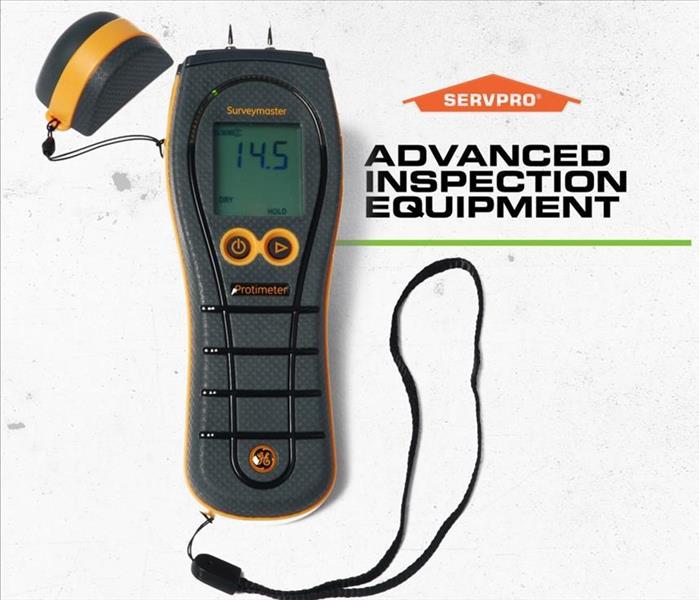 We only use advanced inspection equipment to determine moisture content.
We only use advanced inspection equipment to determine moisture content.
Do you know who to call or what to do if your hot water heater line rusted out and flooded your basement or crawl space? What if your sump pump failed during hurricane season and your entire basement has a foot of standing water? Water emergencies happen when you least expect it-therefore you’ll need to take immediate action to being the mitigation process. Call the professionals at SERVPRO of Macon!
Getting To The Source
The main thing is to begin the water extraction process to be able to save the affected areas as much as possible and get the area dry before any possible mold can set in. Our certified technicians are trained to extract water and sewage damage by using specialized equipment quickly and efficiently. Our professionals will also begin to remove any germs, mold or odors the damage has left behind. You can always depend on SERVPRO of Macon to mitigate any water or sewage cleanup and deodorize your home “Like it never even happened.”
SERVPRO of Macon is a 24-hour emergency service that has been servicing Macon and Middle Georgia for over 40 years! We’ll work with you and your insurance company to make the process seamless as possible. Contact us anytime at 478-474-6700.


 24/7 Emergency Service
24/7 Emergency Service













